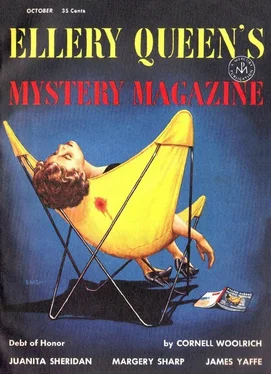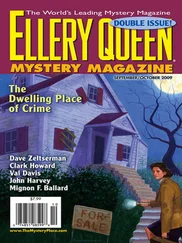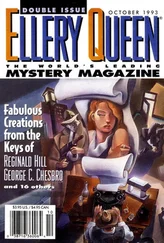Stephen Barr - Ellery Queen's Mystery Magazine, Vol. 24, No. 4. Whole No. 131, October 1954
Здесь есть возможность читать онлайн «Stephen Barr - Ellery Queen's Mystery Magazine, Vol. 24, No. 4. Whole No. 131, October 1954» весь текст электронной книги совершенно бесплатно (целиком полную версию без сокращений). В некоторых случаях можно слушать аудио, скачать через торрент в формате fb2 и присутствует краткое содержание. Город: New York, Год выпуска: 1954, Издательство: Mercury Publications, Жанр: Классический детектив, на английском языке. Описание произведения, (предисловие) а так же отзывы посетителей доступны на портале библиотеки ЛибКат.
- Название:Ellery Queen's Mystery Magazine, Vol. 24, No. 4. Whole No. 131, October 1954
- Автор:
- Издательство:Mercury Publications
- Жанр:
- Год:1954
- Город:New York
- ISBN:нет данных
- Рейтинг книги:5 / 5. Голосов: 1
-
Избранное:Добавить в избранное
- Отзывы:
-
Ваша оценка:
- 100
- 1
- 2
- 3
- 4
- 5
Ellery Queen's Mystery Magazine, Vol. 24, No. 4. Whole No. 131, October 1954: краткое содержание, описание и аннотация
Предлагаем к чтению аннотацию, описание, краткое содержание или предисловие (зависит от того, что написал сам автор книги «Ellery Queen's Mystery Magazine, Vol. 24, No. 4. Whole No. 131, October 1954»). Если вы не нашли необходимую информацию о книге — напишите в комментариях, мы постараемся отыскать её.
Ellery Queen's Mystery Magazine, Vol. 24, No. 4. Whole No. 131, October 1954 — читать онлайн бесплатно полную книгу (весь текст) целиком
Ниже представлен текст книги, разбитый по страницам. Система сохранения места последней прочитанной страницы, позволяет с удобством читать онлайн бесплатно книгу «Ellery Queen's Mystery Magazine, Vol. 24, No. 4. Whole No. 131, October 1954», без необходимости каждый раз заново искать на чём Вы остановились. Поставьте закладку, и сможете в любой момент перейти на страницу, на которой закончили чтение.
Интервал:
Закладка:
Ellery Queen’s Mystery Magazine, Vol. 24, No. 4. Whole No. 131, October 1954

Debt of Honor
by Cornell Woolrich [1] Copyright, 1938, by Cornell Woolrich; originally titled “IOU — One Life.”
To the others in the back room, Second-Grade Detective Clinton Sturgess said, “So long, fellows — see you tomorrow.” He went down the hall, past the sergeant’s desk, out of the precinct house and into the velvety softness of an August dusk. He went around the corner to the garage, got his old car out. He swung it up the ramp to the street, stopped long enough to light a cigarette, exhaled an enjoyable “Aahh!” and started homeward, whistling.
It was a swell night. It was a swell life. He was 35, had a nice wife and a nice kid, he was a second-grader, and he wasn’t stopping there. He had it all lined up before him, step by step: first-grade, lieutenant, captain, inspector. Still remote those steps were, but not unattainable. The way lay plain before him, with odds just stiff enough to try his mettle, and the rewards generous to a fault. It was a swell night. It was a swell life.
He was out on the lake shore drive now, with its lights curving around before him in a long vista and the lake gray-violet in the twilight. His rented little bungalow was a little far out from the city, in a district not yet fully built up; but it was cheaper out there and you got more for your money.
He was whistling My Blue Heaven. It was old but it stayed with him, and the words in his mind fitted his contentment.
A turn to the right —
A little white lights
He made the turn (but it was to the left) and climbed the steep grade that led to their house. The development was called Lakeview Heights because it was strung along the top of this bluff. He parked at the curb instead of backing into the garage because he’d decided to take his family to the movies. He sounded the horn, and the porch light went on and they both came out in a flurry, his wife just to the lower step, the kid flying out all the way to swing from his neck as he stepped from the car and caught her.
The kid was pretty. Everybody said so. She’d been on loan to them from heaven for seven years now, and each time he could see the place she’d come from just by looking at her.
“Get your things ready. We’re going to the movies.”
The flurry became a whirlwind. His wife said, “I’ve got supper waiting for you on the table. We’re finished already. Barbara, come in and get your hat.”
He turned the car around to face downhill, to save time leaving, and braked once more. The kid came racing out past him a second time as he got up to the porch. “I’ll wait for you in the car!” she cried gaily.
“All right — but don’t monkey with the horn now.”
He wasn’t even sitting down yet, he was crouched above a chair in the act of pulling it forward under him, and his wife was passing him a plate across the table. He was in a straight line with the porch door. He happened to turn his head that way, and there was something wrong. There was a blankness out where there shouldn’t have been. He could see the opposite side of the street.
His chair cracked over and he was running through the living room to the porch. Behind him a plate shattered on the floor and the S.O.S. of his wife’s heels came tapping after him.
He could still hear the whisper of the car’s going receding on the hushed night air. No engine. So then he knew what had happened, and the knowledge nearly felled him, like a crowbar across the top of his head, even before he got out to the porch and could see.
Street lamps made it bright all the way down, all the way to where — the lake was. The car was going straight as an arrow. It didn’t swerve at all. Its momentum held it gripped too tightly. A little arm was thrust briefly out at the side, then withdrawn again. A sort of gay wave; coasting was fun.
There wasn’t a sound behind him. Somehow he knew, without looking, that his wife had fallen senseless there on the walk. But he was already yards down that fearful incline. He ran down that hill like nothing that had ever run down it before.
It was all over so quickly, so soundlessly. He had been gaining on the car, but the foot of the street came too quickly. Horror such as a man sees only once in a lifetime was fleetingly there before his eyes, then gone again. But never quite gone again until the day he’d die. For the car reached Lakeshore Drive, swept across its triple-lane width, unerringly hurtled the pitifully low pedestrian parapet — it was such a new development, and it would have hidden the beauties of the lake to have built it any higher — cleared the barrier almost by the unaided resiliency of its own tires and springs, with a flaring of dust and a crumbling along the top, and was gone from sight.
It was as instantaneous as the exposure of a snapshot. Two of the limestone blocks along the upper tier, a car’s width apart, had been knocked out by the wheels, giving a battlement effect. But the spray that had risen on the other side never seemed to finish falling back into place.
There was a screaming of brakes off to one side of him as he darted across the roadway, and some kind of a pitching, swerving beam of light flicked at him. Somebody’s arrested headlights maybe.
A horrid heaving was there below him as he mounted one of the loosened blocks. The high-posted driveway lights behind him played up a single blister-like bubble formed there in the water, a bubble that refused to burst, that kept renewing itself from below. He didn’t bother about his coat. He aimed himself face-forward into those roiling eddies, and as he went down the thought that he couldn’t swim was with him, but that didn’t matter.
He went in wrong, with a spanking blow across the chest and stomach. He went down a little way, arms groping before him — toward nothing. Then he was being pushed up again, and he didn’t know how to make himself go down any farther. He didn’t know how not to breathe either, and long before he could get up again he was nothing but a mass of convulsive muscular spasms, drawing in destruction at every inhalation. He broke the surface briefly, but he didn’t know how to take advantage of it. He was already dying himself now, as he went under again.
Something swift and safe and sure got him at some point after that. He never knew when, and it drew him backward through water and up into air, air that now hurt as much as water, but didn’t kill. Then he was lying there heaving like a bellows, on a tiny lip of soil that protruded at the base of the parapet, and there was a man standing over him, dripping but not spent, looking down at him with a sort of scorn that had no solicitude or consideration to it. The man said, “What the hell did you go in for, if you can’t swim?”
Sturgess turned over on his face, supporting himself on his hands, and between spasms of coughing managed to strangle out: “My kid! In a car down there—!”
The man was suddenly gone again. And in a little while, in only the space between two paroxysms of coughing it seemed, she was there again before his eyes, cradled in the man’s arms, her face so blue and still in the darkness. From where he lay Sturgess just mutely looked his gratitude, as the stranger climbed up over the parapet still holding her, toward the waiting arms of quickly gathered spectators reaching down to help.
Читать дальшеИнтервал:
Закладка:
Похожие книги на «Ellery Queen's Mystery Magazine, Vol. 24, No. 4. Whole No. 131, October 1954»
Представляем Вашему вниманию похожие книги на «Ellery Queen's Mystery Magazine, Vol. 24, No. 4. Whole No. 131, October 1954» списком для выбора. Мы отобрали схожую по названию и смыслу литературу в надежде предоставить читателям больше вариантов отыскать новые, интересные, ещё непрочитанные произведения.
Обсуждение, отзывы о книге «Ellery Queen's Mystery Magazine, Vol. 24, No. 4. Whole No. 131, October 1954» и просто собственные мнения читателей. Оставьте ваши комментарии, напишите, что Вы думаете о произведении, его смысле или главных героях. Укажите что конкретно понравилось, а что нет, и почему Вы так считаете.












